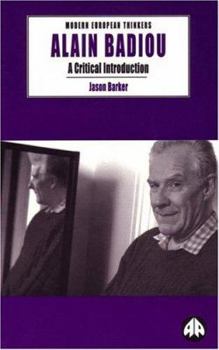Alain Badiou: A Critical Introduction
'[Badiou's theory] enacts a return to full-blown philosophy that strikes as a thunder into the morass of postmodernist sophisms and platitudes. . . . [Badiou] aims at the very heart of politically... This description may be from another edition of this product.
Format:Paperback
Language:English
ISBN:0745318002
ISBN13:9780745318004
Release Date:February 2002
Publisher:Pluto Press (UK)
Length:200 Pages
Weight:0.70 lbs.
Dimensions:0.6" x 5.3" x 8.5"
Customer Reviews
4 ratings
About Time
Published by Thriftbooks.com User , 20 years ago
What a great read!! Fabulous introduction to Alain Badiou. Clear and Concise. Well Done!!
what's in a name
Published by Thriftbooks.com User , 20 years ago
I came to this book via Kaplan's "The Nothing that is", and was advised to read B's book on numbers - until I found it was in French! The difference here is that there is no history of zero, which B calls the void, apparently because the development of the set theory which has the void as main key term is a name which doesn't present anything. It's a discourse without, from what I could see anyway, any social or historical implication. "Nothing" is what orders multiplication but its discovery doesn't do much for civilization, esp. given all the space and attention the authro gives to Badiou's belief in dodgy Marxism. Not sure I got the idea behind the political application of set theory, since if the truth procedures are absolute and a-social how does maths relate to politics? I looked at Think Again the other Badiou tome in a bookshop and thought it better to read this one more time. Somewhere between bananas and brilliant
A convert confesses
Published by Thriftbooks.com User , 20 years ago
Unlike previous reviewer I came to Badiou with no prior knowledge or expectations apart from his claim to be a 'platonist of the multiple'. This perplexed me because if there is no transcendence of the One then the truth Badiou talks about would, philosophically, make little sense. It seems that his way round this lies with a key distinction between the procedures OF truth which include politics and truth itself. So Badiou is making a category distinction between "generic" procedures and philosophy which governs their truths, and without which these truths wouldn't be able to function. So without truth politics is just a violent set of power relations which cannot be proved true. Well, this is one way of extending the French Revolution into the 20th century! (Brings to mind the alleged remark of Lin Piao when asked what he thought of the French Revolution: "It's too early to say")Also the psychoanalysis dimension is something I hadn't picked up before and that the author makes clear for the novice. One passage that stands out is where we read that for Lacan "language", although a social contract, "threatens the integrity of clinical practice by undermining the presentation (as the scientific proof by replication) of APPROVED psychoanalytic procedures." So in other words Lacan has started a religious sect?! Ok, so "scientific proof" takes precedence, but this passage opened up a whole new way of looking at the relationship between sceince and the question of religion for me. Whether Badiou has started up a religious sect, or that's what he aims to do, is something I'm still not sure about. But one thing is for sure that after reading this book I'll never look at Lacan in the exact same way.One other thing: save yourself the trouble of sending back this product as I did because "Alain Badiou: Strong Thought" doesn't exist. The book's real title is "Alain Badiou: A Critical Introduction".
Best of the Bunch
Published by Thriftbooks.com User , 20 years ago
This is the best introduction to Badiou I've read, it's main advantage over shorter and much lengthier pieces by Gillespie and Hallward is the style and focus of Barker's argument. Barker manages to condense a huge amount of material in 189 pages, no mean feat, including an appendix and comprehensive index (a more detailed bibliography of Badiou works would have helped). One criticism would be that far too scant regard is paid to Badiou's mid-period work Theorie du sujet, especially since the parallels Barker does draw between this book and Being and the Event are disputable and under-theorised , although consistent in terms of the main thrust of the book. Barker concentrates on two of the four so-called generic fidelity procedures that define Badiou's philosophy, science and politics. I would have preferred to read a bit more about art which is rarely given much treatment, and Badiou's own comments in this field I find rather obscure and sometimes baffling (having said this there was the appearance recently of the film essays in Infinite Thought). Barker explains the link between set theory and mathematician Cantor's ultimately doomed attempts to "solve" the continuum hypothesis and the quest for political emancipation and universal "democracy" superbly well, however he takes no account and makes little mention of the role of Sylvain Lazarus' work in leading Badiou towards a more sophisticated political stance. Whereas in Being and the Event the social multiplicities appear to rule out any role for workerist politics, in Abrege de metapolitique (1998) workers are given a more active and subjective role in deciding the course of political events. I particularly enjoyed Barker's Mao references in the treatment of "forcing" although an equivalent mathematical formulation would have certainly helped me digest this difficult concept. But overall this book is set to become an invaluable reference guide as Badiou's major works begin to come into English. Full marks!





